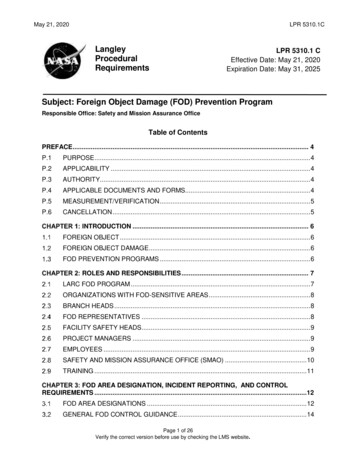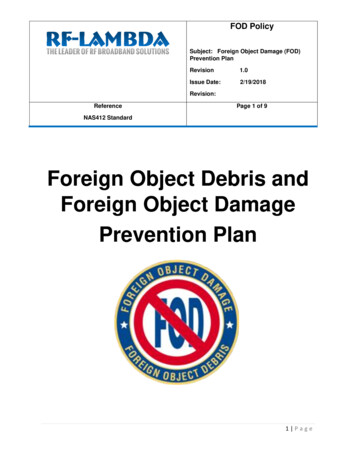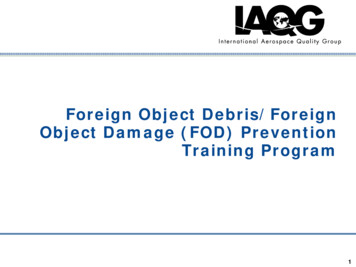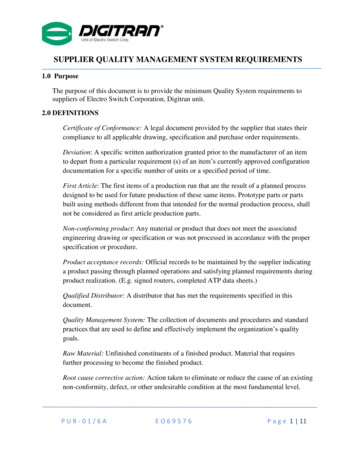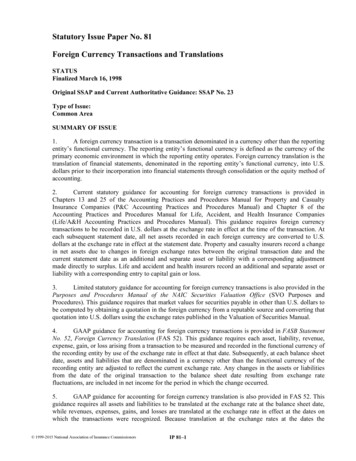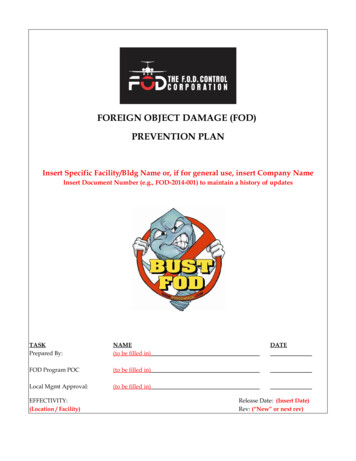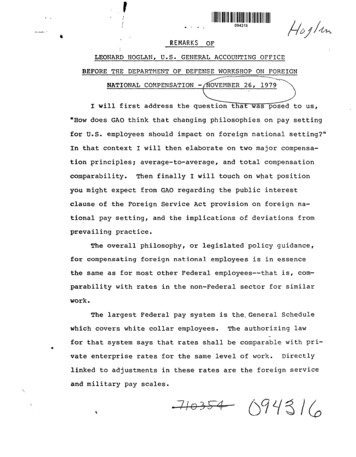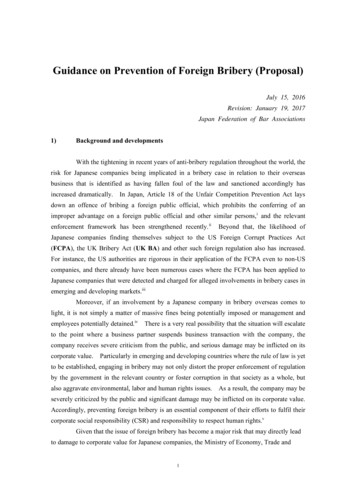
Transcription
Guidance on Prevention of Foreign Bribery (Proposal)July 15, 2016Revision: January 19, 2017Japan Federation of Bar Associations1)Background and developmentsWith the tightening in recent years of anti-bribery regulation throughout the world, therisk for Japanese companies being implicated in a bribery case in relation to their overseasbusiness that is identified as having fallen foul of the law and sanctioned accordingly hasincreased dramatically.In Japan, Article 18 of the Unfair Competition Prevention Act laysdown an offence of bribing a foreign public official, which prohibits the conferring of animproper advantage on a foreign public official and other similar persons,i and the relevantenforcement framework has been strengthened recently. iiBeyond that, the likelihood ofJapanese companies finding themselves subject to the US Foreign Corrupt Practices Act(FCPA), the UK Bribery Act (UK BA) and other such foreign regulation also has increased.For instance, the US authorities are rigorous in their application of the FCPA even to non-UScompanies, and there already have been numerous cases where the FCPA has been applied toJapanese companies that were detected and charged for alleged involvements in bribery cases inemerging and developing markets.iiiMoreover, if an involvement by a Japanese company in bribery overseas comes tolight, it is not simply a matter of massive fines being potentially imposed or management andemployees potentially detained.ivThere is a very real possibility that the situation will escalateto the point where a business partner suspends business transaction with the company, thecompany receives severe criticism from the public, and serious damage may be inflicted on itscorporate value.Particularly in emerging and developing countries where the rule of law is yetto be established, engaging in bribery may not only distort the proper enforcement of regulationby the government in the relevant country or foster corruption in that society as a whole, butalso aggravate environmental, labor and human rights issues.As a result, the company may beseverely criticized by the public and significant damage may be inflicted on its corporate value.Accordingly, preventing foreign bribery is an essential component of their efforts to fulfil theircorporate social responsibility (CSR) and responsibility to respect human rights.vGiven that the issue of foreign bribery has become a major risk that may directly leadto damage to corporate value for Japanese companies, the Ministry of Economy, Trade and1
Industry revised in July 2015 its guidelines on the bribery of foreign public officials (the"METI Guidelines").This put forward new perspectives such as the "importance of theattitude of and message from top management," a "risk-based approach," "necessity of takingaction at subsidiaries level" and "response in an emergency situation" by way of measuresdesigned to enhance the effectiveness of the compliance program for prevention of bribery forforeign public officials.2)The aim of this GuidanceIn light of the abovementioned background and developments, we have decided toissue this Guidance to provide practical guidelines for Japanese companies (and counsel whoprovide legal advice to them) in relation to implementation of anti-bribery measures.It isintended as a supplement to the METI Guidelines and should contribute to the promotion ofcorporate social responsibility and human rights advocacy, while aiding sustainable overseasexpansion by Japanese companies.In particular, this Guidance is intended to be used from thefollowing three perspectives:(1) To clarify the elements of an anti-bribery compliance program necessary to fulfil the duty toimplement an internal control systemAccording to case law, as an aspect of their fiduciary duties under the Companies Act,the directors of a Japanese company owe a duty to implement (i.e., devise and execute) aninternal control system.As stated above, breaching anti-bribery regulation now involves agreater risk of damage to their corporate value, and it is no longer enough for companies torespond by maintaining the same measures they have previously taken.To fulfil the directors'duty to implement an internal control system, it is critical that the top management face the risks,clearly take a proactive stance to enhance the prevention of foreign bribery both internally andexternally, and implement an internal control system to address the bribery risks, includingcompliance with foreign regulations throughout the corporate group.This Guidance clarifies the elements of an anti-bribery compliance program that aregenerally required for directors to be deemed to have fulfilled their duty to implement aninternal control system.Whereas Chapter 2 of the METI Guidelines also provides examples ofwhat an anti-bribery compliance program should look like as a component of an internal controlsystem, this Guidance sets out more explicitly the elements of an anti-bribery complianceprogram that are required to be incorporated in an internal control system, taking account of thecase law concerning the duty to implement an internal control system, the regulations and2
enforcement practices of various countries, the approaches currently being taken by companiesin relation to anti-bribery compliance program, and so forth.(2) To clarify the elements of internal control system that may help the company seek mitigationof or relief from penaltiesEven in the event that a company's involvement in bribery comes to light, there aresituations where penalties may be mitigated or avoided if an adequate internal control systemhas been put in place.The UK BA expressly provides that it is a complete defense for acompany to demonstrate that it had in place appropriate procedures to prevent bribery.vi Also,although this does not constitute a statutory defense under the FCPA, its guidelines provide thatwhether or not a company had in place an appropriate compliance program is to be taken intoaccount in the process enforcement of the FCPA.viiLikewise, in relation to the offence ofbribing a foreign public official under Japanese law, the METI Guidelines provide that in orderfor a company to avail itself of the due diligence defense set out in the provisions relating toparallel corporate liability, " it is necessary to augment the effect of measures for preventingbribery of foreign public officials and to improve the effectiveness of internal controls."viiiWhat this guidance does is to set out more clearly the elements of the internal controlsystems that may prove helpful from the point of view of obtaining mitigation of or relief frompenalties under overseas anti-bribery regulations, taking account of the guidelines issued by theUS and UK authorities.ix(3)To clarify a practical approach to foreign bribery issues for companies and lawyersAlthough the METI Guidelines as revised in July 2015 deserve great credit fordemonstrating how an anti-bribery compliance program should be structured, there is a need formore practical guidelines from the point of view of companies trying to implement it.Inparticular, in those developing and emerging counties where corruption is entrenched, it is notuncommon for Japanese companies' on-the-ground management and employees to be forced toprovide bribes under explicit or tacit pressure by foreign public officials, even though they donot affirmatively offer them.Practical know-how is necessary for Japanese companies toentrust their local staff with the task of handling unreasonable demands and for the local staff todeal appropriately with contingencies, including unreasonable demands, without being left totheir own devices and unsure as to how to proceed.With the above considerations in mind, this guidance clarifies further how companiesand lawyers should approach foreign bribery issues in practice.3
Moreover, the explanation relating to facilitation payments (small payments to ensurethe smooth progress of ordinary administrative services) have been removed in the revisededition of the METI Guidelines.Given, however, that dealing with these payments is an issuethat often comes up both in business practices and in legal consultations, this Guidance setsforth practical guidelines in relation to it.3)The nature and use of this GuidanceThis Guidance summarizes contemporary best practice in relation toanti-briberymeasures.It is expected that Japanese companies will implement anti-bribery measures inreliance on this Guidance in order for their directors to fulfil their duty to implement an internalcontrol system and develop their business abroad in a sustainable manner without being foundto have fallen afoul of regulations in foreign countries and incurring penalties. We believe thatputting this Guidance into practice will be useful both to prevent the erosion of corporate valuethat occurs when the risks associated with bribery eventuate, and to protect local staff from thethreat of unreasonable demands for bribes.We suggest that lawyers also use this Guidance toplay an active role in giving legal advice in relation to anti-bribery matters.Moreover, although this Guidance is primarily intended to address the prevention ofbribes to foreign public officials, given that there are, among other things, foreign countries withregulations prohibiting bribery in the private sector, it addresses the prevention of acts ofbribery in a broad sense, which also encompasses commercial briberies.Accordingly,references in this Guidance to a "foreign public official" include civilians and not merely publicofficials where applicable law prevents a company from making commercial briberies.Additionally, while this Guidance fundamentally provides strong recommendations asto the practice to be taken to prevent foreign bribery, where a practice is no more than arecommended response the applicability of which depends on the physical, human resources oreconomic environment, it is marked "advisable."4)Recommendation as to declarations of implementation of this GuidanceIn an age where it is acknowledged that bribery risks would have a direct impact oncorporate value and the prevention of foreign bribery is regarded as a core strand of corporatesocial responsibility (CSR), there is strong pressure on companies to make active disclosures toinvestors and other stakeholders regarding the status of their anti-bribery measures.xIn thatregard, this Guidance encourages Japanese companies to make a declaration – both internally4
and externally – of the fact that they are putting into place anti-bribery measures in accordancewith this Guidance. Such a declaration of compliance with the Guidance will increasetransparency for stakeholders and may lead to increased public confidence in the company.We expect that Japanese companies will consider making declarations of compliance with theGuidance proactively.iArticle 18(1) of the Unfair Competition Prevention Act provides that "no person shall conferupon a foreign public official or other similar person a pecuniary or other advantage or solicit or offerthe same with a view to causing such public official or other similar person to do or refrain from doinganything in such official capacity or to procure that such official use his status as such to cause anotherforeign public official or other similar person to do or refrain from doing any act in their official capacityin order to gain an unfair business advantage in relation to an international commercial transaction."Breach of Article 18(1) of the Act renders a person liable to imprisonment with hard labour not exceeding5 years and/or a fine not exceeding JPY5 million, or both (Article 21(2)(vii) of the Act). In the casewhere a representative of a legal person, an agent, employee or other servant of a legal or natural personbreaches Article 18(1) in relation to the affairs of that legal or natural person, the Act provides for a finenot exceeding JPY300 million against the legal person (Article 22(1)(iii).iiIn April 2014, the National Police Agency issued a circular to police departments in allprefectures to designate a person in-charge of for anti-bribery measures in order to reinforce theenforcement framework against the offence of bribing a foreign public official.iiiUnder the FCPA, even if a non-US company is involved in bribery in a third country other thanthe US, the relevant regulations can be applied to that non-US company should there be circumstancessuch as, for example, the fact that part of the acts constituting the bribe took place in the US or aconspiracy with a US company (including a non-US company listed at a stock exchange in the US). TheUS authorities are extremely rigorous in their application of the FCPA to non-US companies, and there isa risk that they will deem acts as minimal as paying a dollar-denominated bribe or sending an emailrelating to bribery to a US office as offences of bribery partly taking place within the US. Furthermore,where US companies (including foreign companies listed at a stock exchange in the US) are members of aJV or consortium, there is a risk of being deemed to have conspired with such US companies.ivIn the event of a breach of the anti-bribery provisions of the FCPA, a company will be subjectto a fine of up to USD2 million and an individual will be subject to a fine of up to USD250,000 andimprisonment for up to 5 years. Also, in the event of a breach of the accounting provisions of the FCPA,a company will be subject to a fine of up to USD25 million and an individual will be subject to a fine ofup to USD5 million and imprisonment for up to 20 years. Moreover, where either a company or anindividual has obtained a pecuniary advantage or inflicted loss exceeding any of the limits for the fines setout above, twice the amount of such benefit or loss is substituted for those upper limits. In the event thata company commits the offence of failing to prevent bribery under section 7 of the UK BA, an unlimitedfine may be imposed.vUnder the UN Convention against Corruption (although Japan signed this in 2003, it remains tobe ratified as the Diet Bill transposing it into domestic law is still under discussion) and the OECDConvention on Combating Bribery of Foreign Public Officials (ratified by Japan in 1998), the preventionof corruption has been made an international imperative. Moreover, in the UN Global Compact, theprevention of corruption is given as one of the 10 principles of corporate social responsibility to befulfilled by companies. In addition to that, the close relationship between the prevention of corruptionand human rights has been internationally discussed for purposes of meeting the responsibility to respecthuman rights for which the UN Guiding Principles on Business and Human Rights requests companies.Also, page 31 of the 2009 edition of the Guidelines on Corporate Social Responsibility (CSR) issued bythe Japan Federation of Bar Associations also raised the prevention of unfair practices abroad, such asbribery, as an issue to be addressed as an aspect of corporate social responsibility.viUK BA, s. 7(2).viiA Resource Guide to the U.S. Foreign Corrupt Practices Act, p. 56.viiiMETI Guidelines, p. 31.ixFor a company to comply with anti-bribery regulations (including the regulations of foreigncountries), appropriate measures must be taken, reflecting the situation in which each company finds5
itself, including the extent to which it has expanded abroad, the regions involved, the industry, and thenature of the business it conducts. This Guidance is specifically intended to assist such companies inthat regard.xIn the Non-Financial Reporting Directive adopted by the EU in 2014, so-called 'public-interestentities' (listed companies, financial institutions and so forth) with a headcount in excess of 500 peopleare required to make disclosures as to their situation in terms of the bribery risks they face, the policiesadopted to address them, and the outcome of those policies.6
PART 1IMPLEMENTATION OF ANTI-BRIBERY COMPLIANCE PROGRAMArticle 1.(1)Top management's message and actionsThe message to be given by the top managementThe top management shall take the lead in sending out a clear message that thecorporate group shall never resort to improper practices in the pursuit of profits orsales.(2)The actions to be taken by the top managementIn order to fulfil the preceding paragraph, the top management shall, in respect of thecorporate group as a whole and on a continual basis, take the following actions inresponse to the situation of their bribery risks:(i)make known internally and externally the efforts of the corporate group inrespect of the prevention of bribery by signing a fundamental policy onanti-bribery adopted by the board of directors and making an announcementinternally and externally on the fundamental policy;(ii)communicate to management and employees their position on the preventionof bribery on a continual basis;(iii)establish a body such as a compliance committee or internal controlscommittee that is tasked with administering anti-bribery measures, appoint asenior officer as its head, and vest it with adequate powers to fulfil thisfunction;(iv)decline to approve business activities with high bribery risks;(v)take rigorous disciplinary actions against any management or employeeimplicated in a bribery case irrespective of their position; and7
(vi)make sufficient budgetary allowances for the body referenced insub-paragraph (iii) above to implement anti-bribery measures effectively andensure that sufficient human resources from the legal or compliancedepartment are made available to assist it in its tasks.Article 2.(1)Risk-based approachConducting risk assessmentsWith the aim of adopting a risk-based approach that focuses human and materialresources on business activities that involve a high level of bribery risks, the companyshall conduct a risk assessment by:(i)identifying the countries and regions in which the corporate group is activeand its place of operations, and collating and reviewing the materials andinformation available in relation to the level of corruption in such countriesand regions (e.g., Transparency International's Corruption Perceptions Indexscore);(ii)identifying the level of bribery risks in light of the amount of contact withforeign public officials and other similar persons in the industry in which thecorporate group operates (trading companies, defense, pharmaceuticals,medical devices, natural resources, construction, real estate, logistics andfinance are generally high-risk);(iii)identifying the level of bribery risks by reference to the type of transactionsand the scope of operation (government tenders, customs clearances,undertakings requiring licenses or approvals and manufacturing at localproduction facilities are generally high-risk);(iv)reviewing the message given by the top management, organizationalstructure and the status of implementation of and compliance with internalrules in relation to the corporate group'sand8anti-bribery compliance program;
(v)as regards the method of risk assessment, gathering basic information andconducting hearings, questionnaire surveys and such, to verify the actualsituation regarding corruption in foreign business units and places ofoperations as necessary.(2)Measures proportionate to the level of bribery risksThe company shall analyze the results of the risk assessment in the previous paragraph,rate the bribery risks in light of the nature of the relevant undertakings and the place ofbusiness activities, and determine, among other things, how hospitality and gifts,invitations to foreign public officials and other similar persons, and donations shall beregulated; the subject-matter, frequency and methods of training and monitoring;methods of managing and assessing agents and other third parties; and how to supportsubsidiaries.(3)Conducting continual and periodic risk assessmentsThe risk assessment in paragraph (1) shall be conducted on a continual and periodicbasis. Moreover, should an event occur that has a significant impact on the content ofthe risk assessment, for example, a contingent event of the kind specified in Part 2,consideration shall be given as to whether to re-examine the risk assessment.Article 3.(1)Establishment of a fundamental policy and internal rulesEstablishment of a fundamental policy and internal ruesThe company shall establish, as a framework of internal control for the prevention ofbribery, a clearly defined fundamental policy that sets out its basic position onanti-bribery matters and internal rules that give effect to it.(2)The contents of the fundamental policyThe fundamental policy shall set out the top management's message to the effect thatimproper practices shall not be used in the pursuit of turnover or profit, and make clearto all management and employees of the corporate group that, whether directly orindirectly, bribery to foreign public officials and other similar persons is prohibited.9
(3)The content of the internal rulesThe internal rules shall, proportionate to the level of bribery risks, contain provisionsregarding the following matters:(i)scope of application of the internal rules (making clear the group companiesto which they apply and that management are also subject to them as well asemployees);(ii)unambiguous prohibition on bribery (it is forbidden to give, offer, or promiseor approve those acts for any pecuniary or any other form of advantage toforeign public officials and other similar persons, whether directly orindirectly);(iii)prevention of false accounting (prohibiting accounting treatments andbook-keeping that differ from the actual situation, focusing in particular onpayments made under false entries [such as bribe payments being recorded as"consulting fees"]);(iv)disciplinary actions (making clear, referencing, inter alia, employmentregulation, that disciplinary actions will be taken in the event of breach of theinternal rules [including any rules incorporated by reference therein]);(v)whistleblowing system (making clear that reports on bribery fall within thescope of the whistleblowing system);(vi)organizational structure (an organizational structure handlinganti-briberycompliance at head office and locally); and(vii)internal procedures (procedures regarding the engagement of agents andother third parties, hospitality, gifts, invitations to foreign public officials andother similar persons, and donations).(4)The content of internal procedures10
The internal procedures in sub-paragraph (vii) above shall be formulated referencingthe matters set out below:(i)procedures on hospitality, gift-giving and invitations to public officials andother similar persons (if certain hospitality or gifts are permitted, proceduresshall be formulated making clear in which circumstances and followingwhich procedures such hospitality and gifts may be authorized, and an uppermonetary limit shall be fixed within the permissible range where the locallaw imposes such upper limit, and an upper monetary limit shall bedetermined based on the company's risk assessment where no such limit isfixed by local law and such upper limit may only be exceeded with theauthorization of the in-charge of compliance);(ii)donations procedures (laying down procedures for checking matters such asthe subject-matter of the charity, the fact that the beneficiary genuinely exists,the characteristics of the beneficiary, the purpose and manner in which thedonation is to be provided, and any involvement of any foreign publicofficials or other similar persons); and(iii)(5)procedures for engaging third parties (as per Article 5).The language of the fundamental policy and internal rulesAs necessary, the fundamental policy and internal rules shall be translated into Englishor the local language of the country or region to which they apply.Article 4.(1)Organizational structureThe need to establish an organizational structureTheanti-bribery compliance program shall put in place an organizational structure atboth head office and local establishments, which reflects the scale of business and thebribery risks.(2)Head office organizational structure11
It is advisable to have an organizational structure at the head office whereby:(i)an internal control committee, compliance committee or other committeespecializing in anti-bribery compliance headed by a senior officer other thanthe president(the "ABC Committee") is established, the independence ofwhich from management shall be guaranteed, and which shall report to theboard of directors or the audit committee a majority of which shall beexternal directors; and(ii)the legal, compliance, accounting, human resources, internal audit and otherrelevant departments deal with matters on a practical level under thesupervision of the ABC Committee.(3)Organizational structure at overseas local establishmentsAt overseas local establishments (or, where local establishments are small in scale, therelevant regional headquarter), it is advisable to appoint a local compliance officerwho is independent of local management and who will be responsible for handlingrequests for approval under the internal rules and making reports to the complianceorganization at the head office.(4)Establishing whistleblowing system and helpdeskA whistleblowing system and helpdesk shall be established enabling, in principle, bothJapan-based and local management and employee to make reports or seek advice onan anonymous basis, and proactive efforts shall be made to promote their availability.Article 5.(1)Managing third partiesThe need to manage third partiesThe company shall put in place a management system to prevent bribery carried outthrough agents and other third parties.(2)Third-party assessment framework12
In order to implement the framework in the previous paragraph, the scope of thirdparties to be managed and the manner in which they are to be managed shall bedetermined on the basis of the risk assessment conducted in accordance with Article 2,so as to reflect the level of bribery risks in the country or region where the companyoperates, the transaction amount, and the type of third party (e.g. consultant, agent,distributor, joint venture partner, subcontractor, customs broker, accountant orlawyer).(3)Methods of managing third partiesFor purposes of managing third parties, appropriate methods shall be adopted fromthose listed below, prior to the execution or renewal of any contract or on a periodicbasis, having regard to the level of bribery risks in accordance with the frameworkprovided under the previous paragraph.The person who is invested with the powerto authorize any given transaction with a third party in accordance with the relevantbribery risks shall evaluate such risks in accordance with a reasonable evaluationframework, and determine whether to grant such authorization.(i)Incorporating anti-bribery provisions into the contract with such third partyThere shall at the very least be a warranty and declaration and covenant (tothe effect that the third party in question has not ever and will refrain frombeing involved in corruption), and provision for audit rights (the right toconduct an audit in the event that bribery is suspected) and termination rights(the right to terminate without notice in the event that bribery is suspected).Moreover, it shall be mandatory for the contract to contain provisions as tothe details of the services and deliverables to be provided, delivery dates andthe payee of the contract price (a bank account in a third country shall not bespecified without good reason).(ii)Obtaining a questionnaire and declaration to the effect that they shall refrainfrom bribery from such third partyThis shall set out basic information about the third party (its trading name,the address of its headquarters, contact details, the nature of their businessand date of incorporation), its officers and principal shareholders, as well as13
any relationships they have with a foreign public official or other similarperson (or any relatives of such person); a statement as to whether or notthey have been involved in (or suspected of involvement in) corruption in thepast; and details of a business reference regarding the above information.Additionally, the third party in question shall be made to give a sworn andsigned statement as to the correctness of the above information.(iii)Conducting due diligence into the third partyDepending on the level of bribery risks, consideration shall be given to stepssuch as checking that they have no history of corruption offences via a searchon Google, etc. (as a simple and low-cost method), or whether to obtain,among other things, an extract of the certificate of incorporation to verifythat the third party in fact exists, or, to enhance the compliance system, usinga commercial database of foreign public officials and other similar persons.In addition to that, and particularly in relation to high-risk third parties,consideration shall be given to hiring an investigation firm to conductbackground checks, as well as sending legal or compliance staff to visit thethird party directly to conduct interviews. The results of the due diligenceshall be put into an internal database and updated as and when appropriate.(iv)Requiring a person in charge of the transaction to file an applicationThe person in charge of any given transaction (the "owner") shall beidentified and be required to state in a request for clearance the nature of theservices procured and any deliverables, the specific reasons for engaging theparticular third party and whether the amount payable is reasonable (on a fairmarket value basis), attaching the documents in relation to the mattersreferenced in sub-paragraphs (i) to (iii) above.Article 6.(1)TrainingThe need for training14
As an indispensable element of internal controls foranti-bribery compliance, theprovision
(2) To clarify the elements of internal control system that may help the company seek mitigation of or relief from penalties Even in the event that a company's involvement in bribery comes to light, there are situations where penalties may be mitigated or avoided if an adequate internal control system has been put in place.
